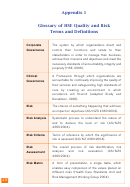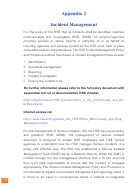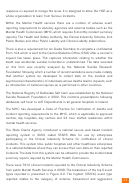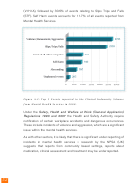Risk Management In Mental Health Services Page 26
ADVERTISEMENT
CHAPTER 3
“The development of clinical risk-management and
risk-assessment approaches within mental health
settings is essential. Reducing exposure to litigation and
financial risk addresses just one narrow aspect of the
risk-management agenda. The recording and analysis
of adverse events in clinical risk management must be
seen in a wider context of service user safety, staff
safety, quality service delivery and clinical governance.”
(A Vision for Change, 2006).
3.1 Clinical Risk Assessment and
Management in Mental Health Services
In the preceding chapters this guidance document has placed much
emphasis on how recovery oriented mental health services, based on
partnership working between service users and mental health
professionals, provides a productive approach to clinical risk assessment
and management. The relationship of mutual respect between the service
user and mental health professional supports mental health professionals
in their duty of care to service users, their colleagues and others, and
recognises the responsibilities of the service user in working with mental
health professionals to manage risk.
The assessment and management of risk is integral to mental health
practice. Effective clinical risk management involves the implementation of
operational procedures and supports which are based on agreed values
and principles. These work to support the service user and enable a
dynamic sensitivity to the individual’s needs, vulnerabilities and evolving
behaviours. The goal of these procedures is risk reduction and the
provision of high quality, effective services (O’Rourke 2003, O’Rourke and
Hammond 2005).
25
ADVERTISEMENT
0 votes
Related Articles
Related forms
Related Categories
Parent category: Business
 1
1 2
2 3
3 4
4 5
5 6
6 7
7 8
8 9
9 10
10 11
11 12
12 13
13 14
14 15
15 16
16 17
17 18
18 19
19 20
20 21
21 22
22 23
23 24
24 25
25 26
26 27
27 28
28 29
29 30
30 31
31 32
32 33
33 34
34 35
35 36
36 37
37 38
38 39
39 40
40 41
41 42
42 43
43 44
44 45
45 46
46 47
47 48
48 49
49 50
50 51
51 52
52 53
53 54
54








